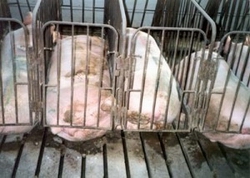 Gestation crates are used to confine pregnant pigs. They are only about two feet wide, which is so small the pigs can’t even turn around in them. Breeding pigs are kept in these cruel crates for most of their lives.
Gestation crates are used to confine pregnant pigs. They are only about two feet wide, which is so small the pigs can’t even turn around in them. Breeding pigs are kept in these cruel crates for most of their lives. The Humane Society of the U.S. describes the suffering caused by the gestation crates as “among the worst of all factory-farmed animals.”
Fortunately, they are becoming a pariah among food companies. Arby’s, the second largest quick service sandwich chain in the U.S., with over 3,500 restaurants, is the latest company to announce a new policy to eliminate gestation crates from its pork supply chain.
In a statement, Arby’s said it is “committed to only working with suppliers who have policies in place to work towards the elimination of gestation crates on sow farms.”
The fast food company added, “We believe there are more humane and sustainable alternatives to gestation crates and are actively collaborating with our suppliers to implement solutions that align with our company’s commitment to animal welfare.”
The Humane Society of the United States (HSUS) has pushed for the elimination of gestation crates. The animal welfare organization “applauds Arby’s for closing its doors to pork producers that aren’t eliminating gestation crates,” said Josh Balk, corporate policy director of farm animal protection for The HSUS. “If you’re a pork producer without plans to move away from gestation crates, you’ve nearly run out of buyers willing to purchase your products. It’s time to change.”
Over 40 leading food companies have made commitments to phase gestation crates out of their pork supply chains. The last few months, a number of companies have made announcements, including Metz Culinary Management, one of the top food service companies in North America, and Target, the fourth largest food retailer in the U.S. The other companies that have made announcements to phase out gestation crates from their pork supply chains include:
• Other fast food chains: McDonald’s, Burger King, Wendy’s, Jack in the Box, Wienerschnitzel, Subway, Fresh Enterprises (owner of Baja Fresh, La Salsa Mexican Grill and Canyon’s Burger fast food chains), CKE Restaurants (owner of Carl’s Jr. and Hardee’s chains), and Sonic
• Restaurant chains: The Cheesecake Factory, Bruegger’s Bagels, Dunkin’s Brands, Cracker Barrel and Denny’s
• Food companies: ConAgraFoods, one of the largest food companies in the U.S., Hillshire Brands, Atlantic Premium Brands (distributes to major retailers, including Walmart, Costco, Kroger, and Albertson’s), Campbell Soup. Co., Kraft Foods (the world’s second largest company), Sysco, Hormel Foods and Smithfield Foods
• Food service companies: Sodexo (the world’s second largest food service company), Compass Group (the largest food service company), Aramark and Bon Appetit Management Company
• Grocery store chains: Harris Teeter Supermarkets, Kroger, Safeway, and Costco
In addition to the pledges by companies to phase out gestation crates, there has been legislation to ban them. Nine U.S. states have passed laws to ban gestation crates.





